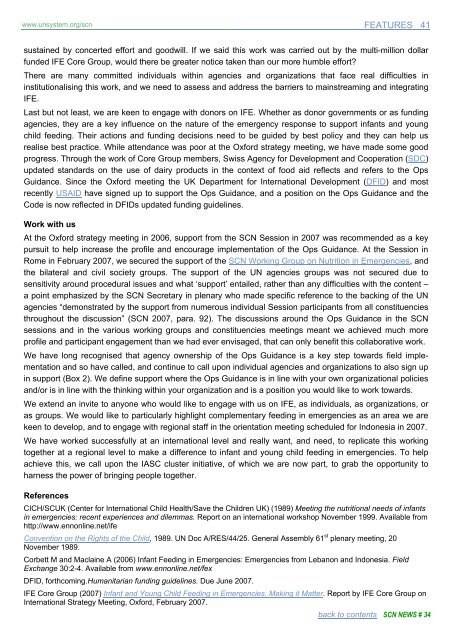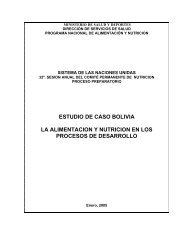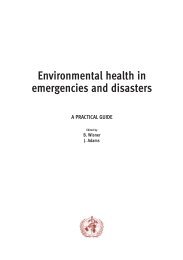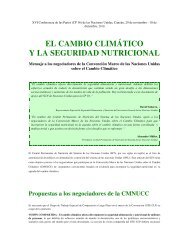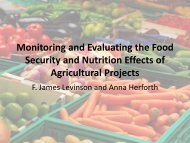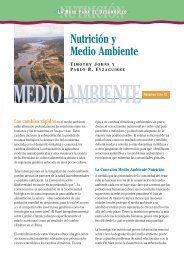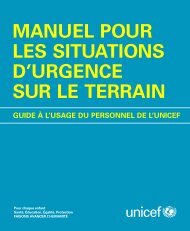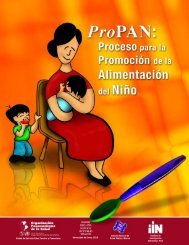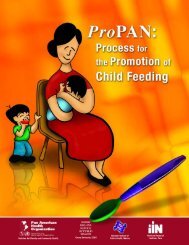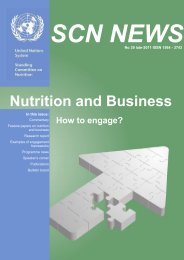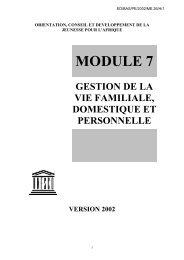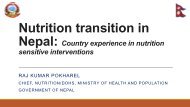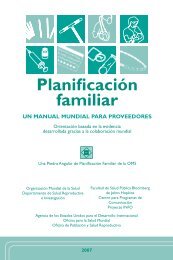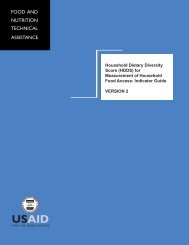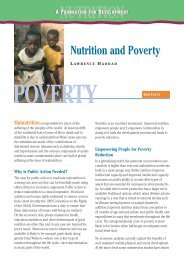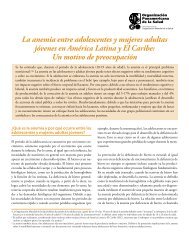SCN News No 34 - UNSCN
SCN News No 34 - UNSCN
SCN News No 34 - UNSCN
You also want an ePaper? Increase the reach of your titles
YUMPU automatically turns print PDFs into web optimized ePapers that Google loves.
www.unsystem.org/scn FEATURES 41<br />
sustained by concerted effort and goodwill. If we said this work was carried out by the multi-million dollar<br />
funded IFE Core Group, would there be greater notice taken than our more humble effort?<br />
There are many committed individuals within agencies and organizations that face real difficulties in<br />
institutionalising this work, and we need to assess and address the barriers to mainstreaming and integrating<br />
IFE.<br />
Last but not least, we are keen to engage with donors on IFE. Whether as donor governments or as funding<br />
agencies, they are a key influence on the nature of the emergency response to support infants and young<br />
child feeding. Their actions and funding decisions need to be guided by best policy and they can help us<br />
realise best practice. While attendance was poor at the Oxford strategy meeting, we have made some good<br />
progress. Through the work of Core Group members, Swiss Agency for Development and Cooperation (SDC)<br />
updated standards on the use of dairy products in the context of food aid reflects and refers to the Ops<br />
Guidance. Since the Oxford meeting the UK Department for International Development (DFID) and most<br />
recently USAID have signed up to support the Ops Guidance, and a position on the Ops Guidance and the<br />
Code is now reflected in DFIDs updated funding guidelines.<br />
Work with us<br />
At the Oxford strategy meeting in 2006, support from the <strong>SCN</strong> Session in 2007 was recommended as a key<br />
pursuit to help increase the profile and encourage implementation of the Ops Guidance. At the Session in<br />
Rome in February 2007, we secured the support of the <strong>SCN</strong> Working Group on Nutrition in Emergencies, and<br />
the bilateral and civil society groups. The support of the UN agencies groups was not secured due to<br />
sensitivity around procedural issues and what ‘support’ entailed, rather than any difficulties with the content –<br />
a point emphasized by the <strong>SCN</strong> Secretary in plenary who made specific reference to the backing of the UN<br />
agencies “demonstrated by the support from numerous individual Session participants from all constituencies<br />
throughout the discussion” (<strong>SCN</strong> 2007, para. 92). The discussions around the Ops Guidance in the <strong>SCN</strong><br />
sessions and in the various working groups and constituencies meetings meant we achieved much more<br />
profile and participant engagement than we had ever envisaged, that can only benefit this collaborative work.<br />
We have long recognised that agency ownership of the Ops Guidance is a key step towards field implementation<br />
and so have called, and continue to call upon individual agencies and organizations to also sign up<br />
in support (Box 2). We define support where the Ops Guidance is in line with your own organizational policies<br />
and/or is in line with the thinking within your organization and is a position you would like to work towards.<br />
We extend an invite to anyone who would like to engage with us on IFE, as individuals, as organizations, or<br />
as groups. We would like to particularly highlight complementary feeding in emergencies as an area we are<br />
keen to develop, and to engage with regional staff in the orientation meeting scheduled for Indonesia in 2007.<br />
We have worked successfully at an international level and really want, and need, to replicate this working<br />
together at a regional level to make a difference to infant and young child feeding in emergencies. To help<br />
achieve this, we call upon the IASC cluster initiative, of which we are now part, to grab the opportunity to<br />
harness the power of bringing people together.<br />
References<br />
CICH/SCUK (Center for International Child Health/Save the Children UK) (1989) Meeting the nutritional needs of infants<br />
in emergencies: recent experiences and dilemmas. Report on an international workshop <strong>No</strong>vember 1999. Available from<br />
http://www.ennonline.net/ife<br />
Convention on the Rights of the Child, 1989. UN Doc A/RES/44/25. General Assembly 61 st plenary meeting, 20<br />
<strong>No</strong>vember 1989.<br />
Corbett M and Maclaine A (2006) Infant Feeding in Emergencies: Emergencies from Lebanon and Indonesia. Field<br />
Exchange 30:2-4. Available from www.ennonline.net/fex<br />
DFID, forthcoming.Humanitarian funding guidelines. Due June 2007.<br />
IFE Core Group (2007) Infant and Young Child Feeding in Emergencies. Making it Matter. Report by IFE Core Group on<br />
International Strategy Meeting, Oxford, February 2007.<br />
back to contents <strong>SCN</strong> NEWS # <strong>34</strong>


